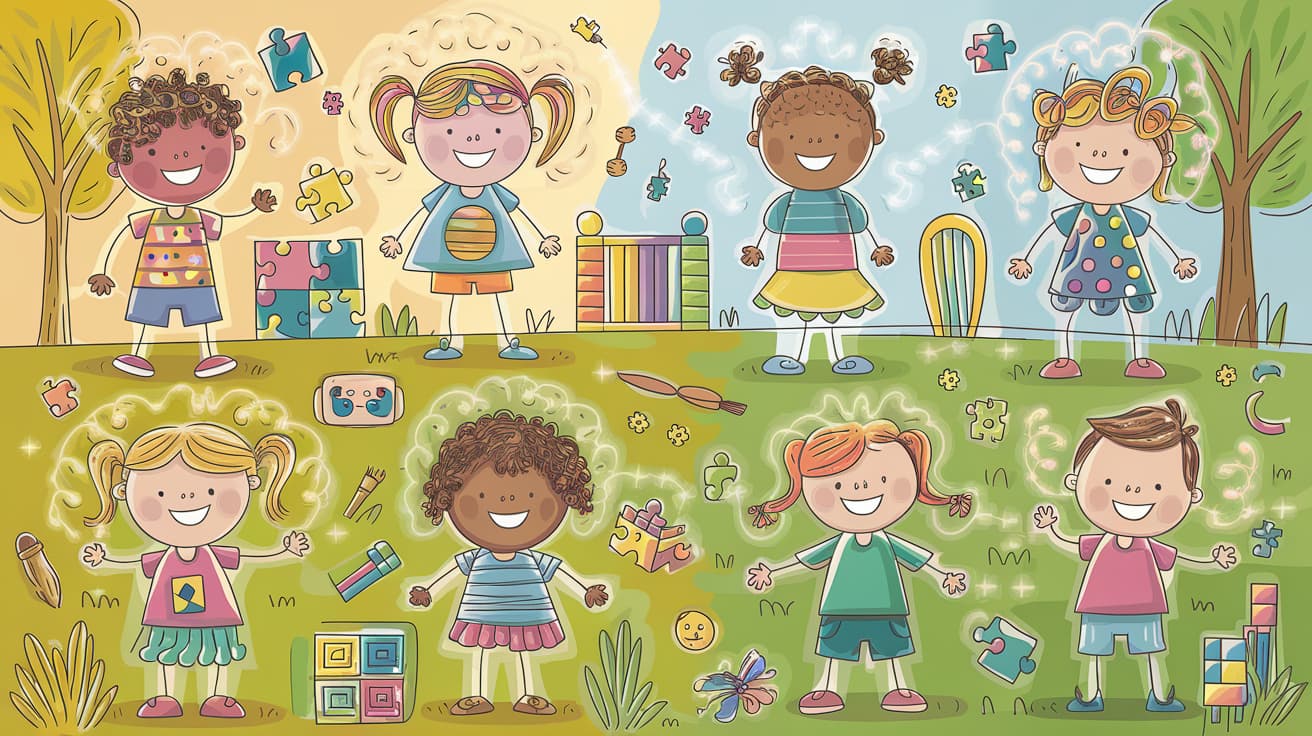Explaining Neurodivergence to Kids.
Imagine a world where every brain worked exactly the same way. Everyone would think the same thoughts, like the same foods, and laugh at the same jokes (even the bad ones). Sounds dull, doesn’t it? Thankfully, brains are wonderfully unique, and explaining neurodivergence to kids is a great way to celebrate those differences. Let’s explore how to explain neurodivergence to kids in a fun and easy way that helps them appreciate the beauty of different kinds of brains.
What Does Neurodivergent Mean?
Neurodivergence is what we call it when someone’s brain works a little differently from what most people expect. And guess what? That’s not just okay, it’s what makes life exciting.
The word “neurodivergent” might sound fancy, but it’s really simple. It just means that someone’s brain works differently from what most people expect. Some people think, feel, or learn in ways that are unique, and that’s perfectly okay.
Unlock peak brain performance with science-backed biohacks. Join free now & get your guide for just £4.99 (45% off)!

Think about it like this. Every brain is like a different kind of gadget. Some are like cameras, focusing on tiny details. Others are like racing cars, zooming through ideas at lightning speed. Both are amazing in their own way.
Examples of Neurodivergence
Here are a few examples to help kids understand what it means to be neurodivergent:
- Autism: People with autism might not love loud noises or bright lights, but they’re often incredible at focusing on things they love. Some can spot patterns faster than anyone else.
- ADHD (Attention Deficit Hyperactivity Disorder): People with ADHD might find it tricky to sit still, but they’re full of energy and often come up with fantastic ideas.
- Dyslexia: Reading and spelling might be a challenge for people with dyslexia, but they’re often super creative and brilliant at thinking outside the box.
Why Are Our Brains Different?
Every brain is like a unique computer. Some are designed to solve puzzles, while others are built to create beautiful pictures or think up wild stories. It’s these differences that make the world such an exciting place to live in.
Imagine a world where everyone was good at the exact same thing. Who would invent cool gadgets, write books, or create music? Neurodivergent brains help keep our world full of variety and surprises.
How Can We Be Good Friends to Neurodivergent People?
Being a good friend means understanding and celebrating the ways our brains work differently. Explaining neurodivergence to kids can help them see why kindness and inclusion matter. Here are some simple ways kids can be great friends:
- Be Patient: Everyone learns and does things at their own pace. Waiting or helping can mean the world to someone.
- Ask Questions: It’s okay to be curious. If a friend is comfortable sharing, they might enjoy explaining what makes their brain unique.
- Include Everyone: Make sure games or activities are fun for everyone, even if it means changing the rules a little.
- Be a Good Listener: If your friend is upset or excited, listen to what they have to say. Sometimes, just being there is enough.
Omega-3 supplements can support brain health and focus, particularly for kids with ADHD. Always consult with your healthcare provider before trying anything.
Why Is Neurodivergence Awesome?
Neurodivergent people often have incredible talents. They might solve problems in ways no one else could think of, create amazing art, music, or stories, or notice tiny details others might miss.
From scientists to artists to inventors, many neurodivergent people have used their unique brains to make the world a better place. Imagine how dull the world would be without their contributions.
Let’s Celebrate Differences: Explaining Neurodivergence to Kids
Our differences are what make life exciting. Whether someone is neurodivergent or not, we can all learn from each other. Everyone’s brain is amazing, and together, we create a world that’s colourful, creative, and full of possibility.
So, the next time you meet someone whose brain works differently, remember, they’re not just unique. They’re awesome! And so are you.
Join Our Community
Want to learn more about neurodivergence, parenting tips, or how to celebrate unique brains? Join our community and connect with others who are exploring similar topics. Share your thoughts, ask questions, and discover resources to help you and your family thrive.







